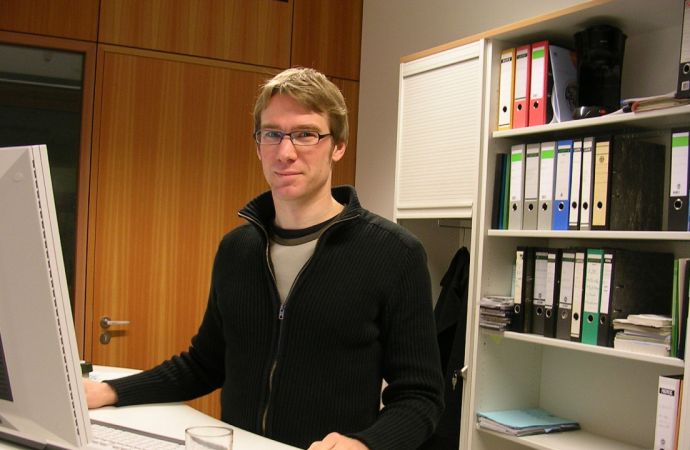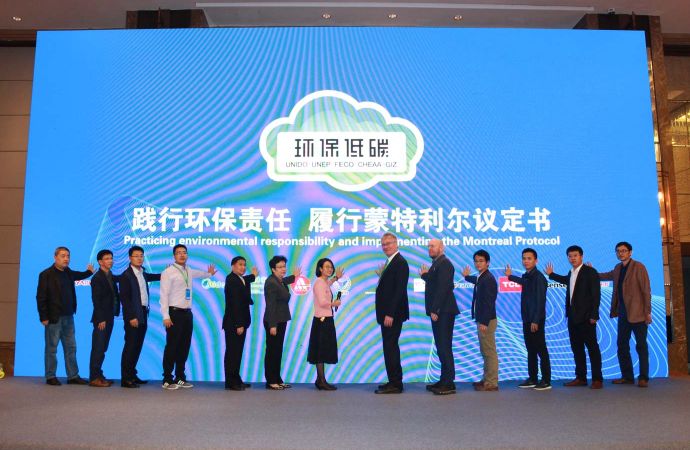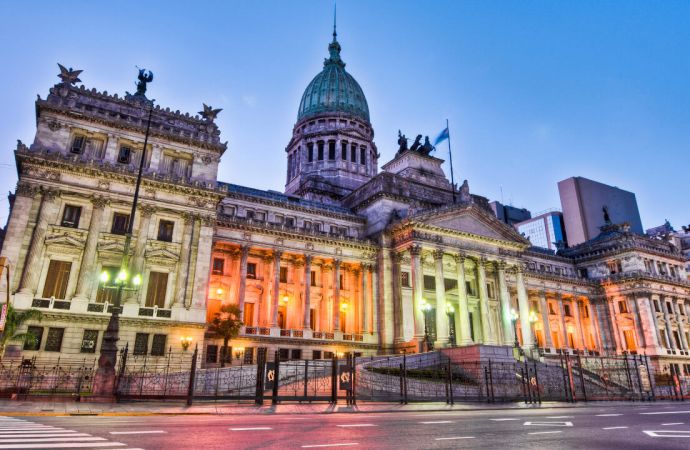But the split AC unit, which received the Blue Angel ecolabel in 2018, may be further delayed by the COVID-19 pandemic, ATMO DTI speaker said.

Daniel de Graaf, German Environmental Agency (UBA)
A small propane (R290) split air conditioner from Chinese appliance giant Midea – the only room AC to earn Germany’s highly demanding “Blue Angel” ecolabel – is expected to enter the European marketplace this year, according to speakers in the policy session at the online ATMO/DTI Technical Conference.
The ATMO/DTI Technical Conference was hosted by shecco (publisher of this website) and the Danish Technology Institute on June 23 and 24.
Barbara Geschrey, Managing Director and Policy Advisor at research firm Öko-Recherche, said a “major” Chinese manufacturer intends to introduceR290 small split AC systems in Europe in the third quarter of 2020.
A subsequent speaker, Daniel de Graaf, Scientific Assistant for the German Environmental Agency (UBA), confirmed that this manufacturer is Midea, which received the Blue Angel ecolabel for its All Easy Series R290 units in 2018. De Graaf said he heard that Midea now has “better units” that it intends to have Blue Angel-certified and bring to the European market in 2020.
However, the COVID-19 pandemic, may alter those plans, he said, adding “Let’s hope for the best that those units will soon be available in Germany and Europe.” (Midea did not respond to requests for comment.)
Two Midea split AC units have qualified for the BlueAngel ecolabel, one with 2.6kW (0.7TR) and another with 3.5kW (1.0TR) of cooling capacity. They each have an R290 charge of 380g.
De Graaf noted that 700,000 R290 room ACs have worked in India “with no problems” and that it should “also be possible [in Europe] to install and operate them safely.” Demand for these environmentally friendly units has been growing in Germany, he added. “We have 2-3 requests at the agency every week.”
The Blue Angel certification, owned by the German Federal Ministry for the Environment and managed by the UBA, is the oldest Ecolabel in the world, established in 1978. It covers 120 product groups; about 1,500 companies 12,000 products have received the label.
For a given product group “normally 20% to 30%” of products receive the label, said de Graaf. However, this is not the case with single split room air conditioners below 12kW (3.4TR) in cooling capacity
GWP under 10
The stringent Blue Angel standard for split ACs was established in 2016. To qualify for a Blue Angel ecolabel, a system must “use halogen-free [non-HFC] refrigerants, and also, no ammonia,” said de Graaf. The GWP of the refrigerant must be below 10.
The seasonal energy efficiency ratio (SEER) “needs to be seven or higher,” he said. “That correspondsto an A++ category in the EU.” In addition, an AC unit needs to have a Seasonal Coefficient of Performance (SCOP) of at least 4.6.
AC units must also be easy to clean and service to ensure a high life-cycle energy efficiency, according to de Graaf.
Further information on the Blue Angel standards for air conditioners can be found here.
Other Labels
De Graaf compared the Blue Angel criteria with ecolabels in Asia and Europe and found them “much less ambitious.”
China’s national Ecolabel, “China Environmental Labeling” does not impose a limit on refrigerant GWP.
Likewise, the Thai Green and South Korean ecolabels only restrict GWP to 2,500 or less. However, “there is no HFC used in air conditioning which is above 2500, so that’s not really a criterion” for sustainability, said de Graaf.
The Nordic Swan, Scandinavia’s ecolabel has set a GWP limit of 2,000.
Let’s hope for the best that those units will soon be available in Germany and Europe.”– Daniel de Graaf, UBA
Related stories



